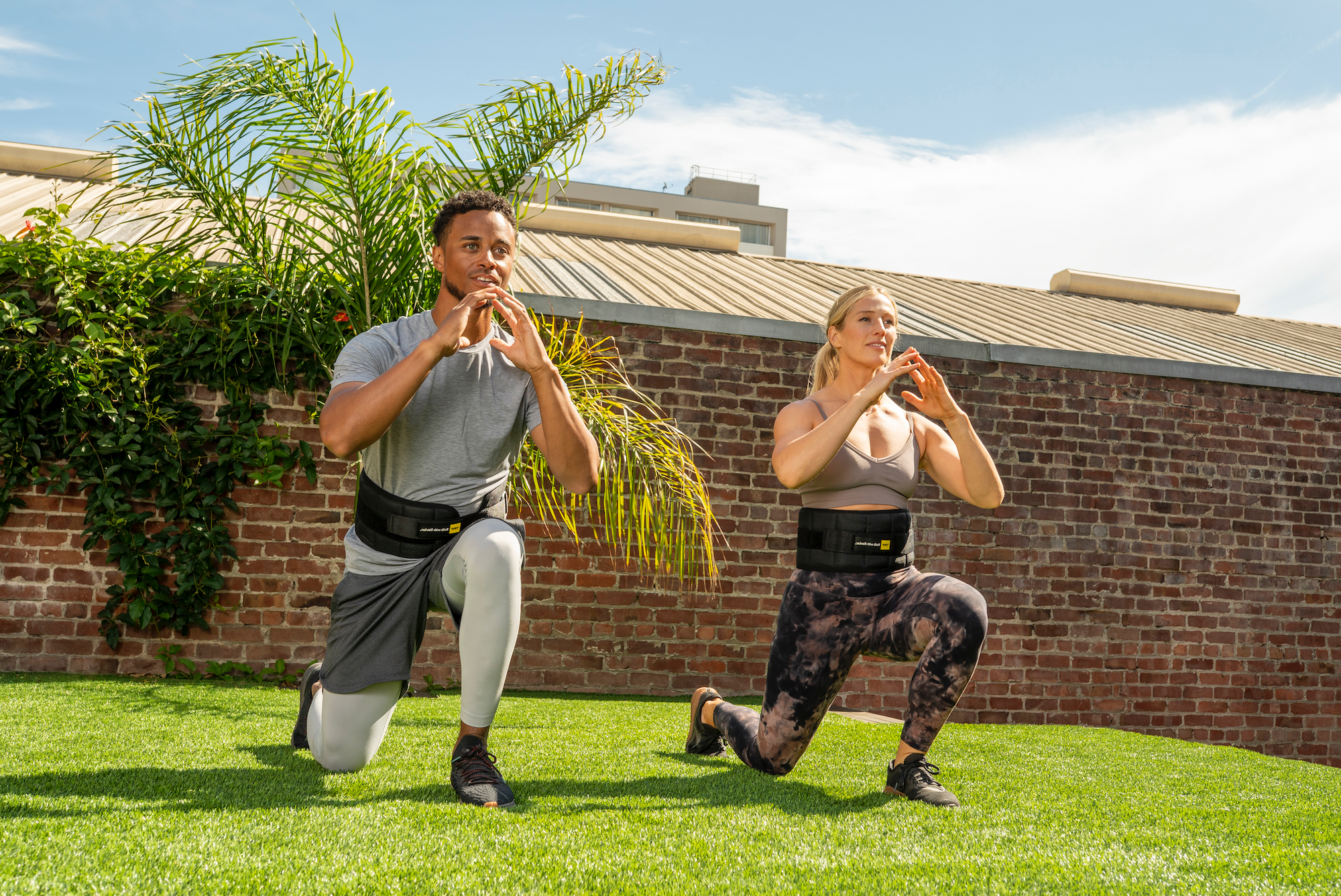TREVOR A: I HAD TO BE CHALLENGING MYSELF AND OTHERS
Trevor "TA" Anderson's career as a player and a coach has been fueled by his desire to compete. Now, he's passing the lessons he's learned on to a new generation of athletes.
Trevor “TA” Anderson logs into Zoom from his car, on his way from his son’s baseball practice to a football game. The call was scheduled to start 90 minutes ago, but TA found himself in territory that any parent of a multi-sport kid knows all too well. “Apparently we had two baseball practices and two football games today, and I thought it was only one baseball practice and two football games. So that's my fault,” he laughs.
In addition to their Orlando, Fla. studio, Better Every Day, TA and his wife, Amber, run a flag football program for kids in Central Florida. The playoffs are tonight. So in between practices, which started at 9 am, and kickoff at 4 pm, TA squeezes in a chat—a generous concession given that he’ll be running football games until 10 pm.
The circuitous route across myriad sports is familiar territory for TA. Multitasking is a well-honed habit. Long days are second nature. They’ve shaped him as a person.
Picture this. Six-year-old Trevor Anderson starts playing soccer in Sarasota, Fla. He’s a quick study in footwork and coordination. And the sports field? Well, it feels like home.
“I played soccer for eight years starting when I was six years old. I really feel like soccer created a foundation for movement and athleticism, speed and endurance. By the time I turned eight, I started playing basketball. When I was nine, I played baseball and football… I picked basketball back up again in 11th grade…and then I also ran track and field.”
Let’s pause here for spoilers.
Right now, this is shaping up to be one of those inspiring stories where the athlete with undeniable passion and talent plays a sport from childhood, through college, all the way to the pros. And yes, TA did eventually play professional sports. But this is not that story.
After high school, TA enrolled at the University of Central Florida with a plan to study criminal justice. He thought he would become a defense attorney. But his body was drawn to competition. He couldn’t ignore it.
“The reality was I didn't understand how strong my desire was to compete. As I got halfway through college, I had to be on the field competing. I had to be running around. I had to be challenging myself and others.”
So TA did what any talented, multi-hyphenate athlete in the South does. He walked onto the football team.
His tenure in the program was a blip.
“I wasn't on scholarship, so that lasted a very short time. I was the guy working full time, and then going to school at night and putting myself through school,” TA said.
After graduation, however, he finally got his shot. TA tagged along to a workout with a friend who was already playing professionally. He ended up working out with NFL and arena football scouts. He had found ways to keep competing every day. He was in the mindset.
“I got signed on the spot.”
Most aspiring athletes never have the chance to play a sport professionally. TA played two.
It started with three years of football—mainly the professional arena leagues, but, yes, even the NFL. (“I didn't end up making the team, but I made it to the NFL locker room and got an opportunity to get into camp,” he said.)
TA then launched a second pro career on the basketball court—in this case, the trampoline court of an extreme version of basketball called SlamBall. “It took me to countries I probably never would've gone to. At the time, I went to Italy and China and different places like that to play SlamBall. It was a really unique experience.”
An experience that netted him some of his closest friends to this day, and an MVP award.
Yet off the court, coaching had always called to TA.
“As I got towards the end of my school, the last year and a half, I said, ‘Man, I know I really love fitness and performance and physiology.” Switching majors that far into college didn’t make sense, so TA decided to take all the exercise science, kinesiology, and physiology electives he could handle instead.
“I realized that that was a perfect compliment to my need to compete, to my competitive mindset. That's when that whole thing started to develop.”
TA already knew loved coaching kids. In college, he had spent summers working at the Boys & Girls Club as a camp counselor.
“I trained kids with exercises and took them to activities, field trips; all that type of stuff. I was probably one of the only adult male positive figures some of these kids even had in their life. I took that very seriously. I just always loved coaching and teaching and educating kids.”
And that’s how it all came together, from student athlete to pro athlete to performance coach. TA never set his sights on a single path and outlined precise steps to success. But when the opportunity to coach other athletes presented itself, he was ready. He followed his gut.

Over the years, that commitment to coaching kids has not waned. TA has run his Better Every Day Basketball and Sports Performance Camps, worked with NBA All-Star Vince Carter’s Youth Basketball Academy and NFL Hall of Famer Anthony Munoz’s foundation, coached youth football camps, and trained sports teams for local high schools. But that’s on top of his work with professional athletes, Olympians, and NCAA standouts.
“You know, I used to say that I was like a jack-of-all-trades, master of none. I thought that that really hurt me when I was younger… As an adult now, being 45 years old, I can do everything, and at a decent level.”
In his day-to-day life as a performance coach, that means TA throws passes with NFL players, shoots hoops NBA stars, fields balls with Major League hitters, and hones drives with PGA champions. All those years TA spent nerding out on physiology and movement have made him a top coach—even in sports that most people wouldn’t expect.
Take golf, for example. In the TRX universe, TA is known as “The Golf Guy,” helping players use tools like the TRX Suspension Trainer and TRX RIP Trainer to strategically target stability, mobility, and strength. He’s created TRX for Golf programming for years. But, as a 6’6” Black man, TA stands out as a performance expert in a sport with few Black athletes.
He likes to tell people, “I look like a basketball player. I played pro football, but I train golfers; you're gonna have to trust me.”
TA has an encyclopedic knowledge of physiology and performance. (And, to be honest, plenty of other topics, too. His son dubbed him “Chocolate Einstein” because he’s such a Jeopardy! buff.) But knowledge alone doesn’t translate to successful coaching. TA also has a unique ability to help athletes think like champions and put in the work to get better every day.
“The best players in the world are never satisfied with where they are. They can be excited and proud of how far they've come, but you can't ever just sit back. As soon as you get complacent, it's not just that you stop getting better, it's like you start to get worse,” he explained. “Excellence is not being the best, it’s being your best.”
Sports—whether factual or fictional—are a metaphor for life and the value of persistence. The Hail Mary pass. The one-legged Olympic vault. The Grand Slam in the bottom of the 9th. A three-point shot at the buzzer. All seemingly-effortless moments that, in reality, were borne of years of practice.
TA’s career as an athlete and a coach has been fueled by those moments. And, as he coaches new generations of athletes, he can speak authentically to the experience of being an athlete and creating a winner’s mindset. The grit. The sacrifice, The determination. He uses that perspective to challenge those around him to challenge themselves.
“It's a unique kind of transition to be able to be a competitive athlete, but also help other people understand how to compete as well. And if I can help them get better every day at what they do, you know, that's a victory for me as well.



